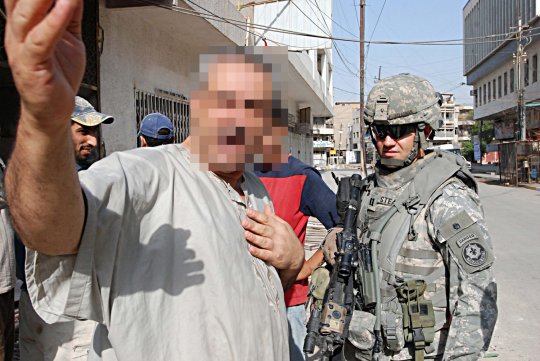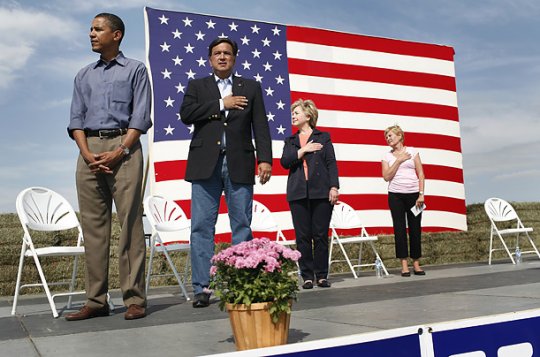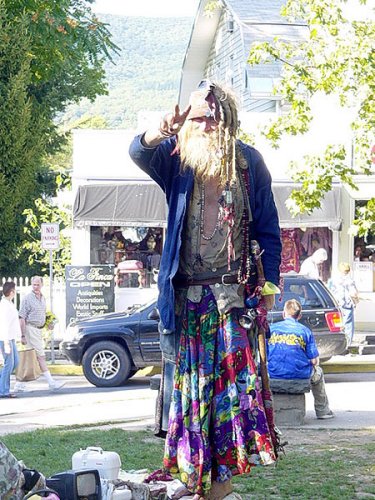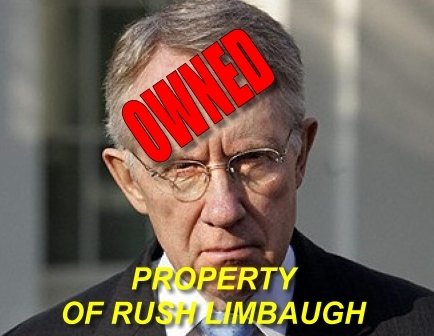
Atlanta, Ga., native Capt. Andrew Steadman, commander of Headquarters Company, 1st Squadron, 2nd Stryker Cavalry Regiment, out of Vilsek, Germany, questions a local man about attacks on coalition forces during a cordon and search of Baghdad’s Adhamiyah neighborhood, Oct. 15. Photo by Sgt. Michael Pryor, 2nd Brigade Combat Team, 82nd Airborne Division Public Affairs.
Soldiers show zero tolerance for attacks in Adhamiyah
BAGHDAD
By Sgt. Mike Pryor
2nd Brigade Combat Team, 82nd Airborne Division Public Affairs
If the people in the Adhamiyah District’s Abu Hanifa Market hadn’t already heard about the afternoon’s grenade attack on a U.S. Soldier, they heard about it when Lt. Col. Jeff Broadwater showed up.
“Who threw the grenade!?” Broadwater shouted, stalking from shop to shop as an Apache gunship circled overhead. “Where are they? Show me where they are and I will take them out of here!”
Not half an hour before, a Soldier from Broadwater’s unit, the 3rd Squadron, 7th Cavalry Regiment, had been wounded by a grenade thrown at his patrol. Now, in response, Broadwater was bringing the full weight of U.S. military to bear in the hunt for the culprits.
“We’re sending a message that attacks will not be tolerated,” said Broadwater, a Fort Knox, Ky. native, as dozens of Iraqi and U.S. troops fanned out through the stalls and shops of the market and helicopters continued to buzz through the sky.
It was a show of force with a purpose. In Adhamiyah – a mostly-Sunni neighborhood in eastern Baghdad which until recently was a hotbed of insurgent activity – the 3-7 Cav. “Sabers” have made dramatic improvements to the security situation by taking a zero tolerance approach to attacks.
“Any time there’s an attack we do an immediate mass response. We flood the area with as many people as we can,” said Staff Sgt. Eric Bull, a section leader with 3-7’s Troop C, from Perryville, Ark. “We don’t want to give the insurgents time to rest.”
“They punch us, we punch back harder,” explained Capt. Andrew Steadman, who commands a quick reaction force of Stryker vehicles based in Adhamiyah.
It’s a policy that began during the Sabers’ first days in the area, when insurgents tried to test the unit’s mettle with grenade and rocket propelled grenade attacks. When they did, they received a ferocious response from the Saber Soldiers, said Roanoke, Va., native Staff Sgt. William Schilling, of Troop B.
Since then, the well of “opportunists” – not hardcore insurgents, but locals willing to shoot a few rounds or lob a grenade at Coalition forces to earn some quick cash – has dried up, Schilling said.
Insurgent leaders have been forced to resort to desperate tactics like paying children to do their attacks for them, said Kisimmee, Fla., native Maj. Ike Sallee, the squadron’s operations officer. The Sabers recently captured a nine-year-old boy who had been paid to throw a grenade at one of their patrols. (The boy was later returned to his parents.)
Broadwater said the Sabers’s tactics have put the insurgents on the ropes, and the numbers seem to back up that claim. There has been a 70 percent overall decline in attacks since the 3-7 took over responsibility for Adhamiyah four months ago, said Sgt. Tim Luna, a squadron intelligence analyst.
When attacks do occur, such as the grenade attack at the market that wounded one Soldier Oct. 15, they are met with an overwhelming response. Even as the wounded Soldier was being evacuated, Broadwater was ordering scores of Soldiers in Humvees and Stryker vehicles to move in to secure the area. Fifteen minutes after the attack, there was a vehicle at every intersection around the market, and dismounted troops had begun searching from building to building.
A few blocks down, Steadman’s Stryker Company was also in position after responding to the call. Soldiers were everywhere: taking a knee at the corners, scanning the sector from positions on the roof, trudging up and down narrow flights of stairs inside an apartment complex, and working their way from courtyard to courtyard. Inside the houses they were polite and professional, careful to make as little of a disruption as possible as they searched.
“We don’t come in to scare people, it’s just to show them our presence and let them know we’re here and we mean business,” said Garden City, Mo., native Spc. Lonnie Pearson, of Headquarters Company, 1st Squadron, 2nd Stryker Cavalry Regiment. Pearson said most residents were friendly and helpful when the Soldiers knocked on their doors.
“They want the bad guys out of here just as bad as we do,” he said.
It wasn’t long before the Soldiers located a witness who had seen the grenade being thrown. He gave them a detailed description of the suspects. The description went out over the net and was passed down to every Soldier. But it was apparently too late. The grenade throwers had managed to slip through the net. Several hours after it began, Broadwater called the search off.
Later that evening, after he had visited the wounded Soldier in the hospital, Broadwater said he felt encouraged by the resolve of his Soldiers – and by the reactions he had seen from people in the community.
“The people see that we’re not going to let (attacks) go unanswered, and they appreciate that,” Broadwater said. And though the insurgents who threw the grenade hadn’t been apprehended, Broadwater was confident he had delivered his message to them.
“We will find you,” he promised. “It may not be this time, but sooner or later, we will find you.”

Wild Thing’s comment……..
I love true military leaders, kick ass and do what needs and has to be done. OH yessssssss!!!!!


















Recent Comments